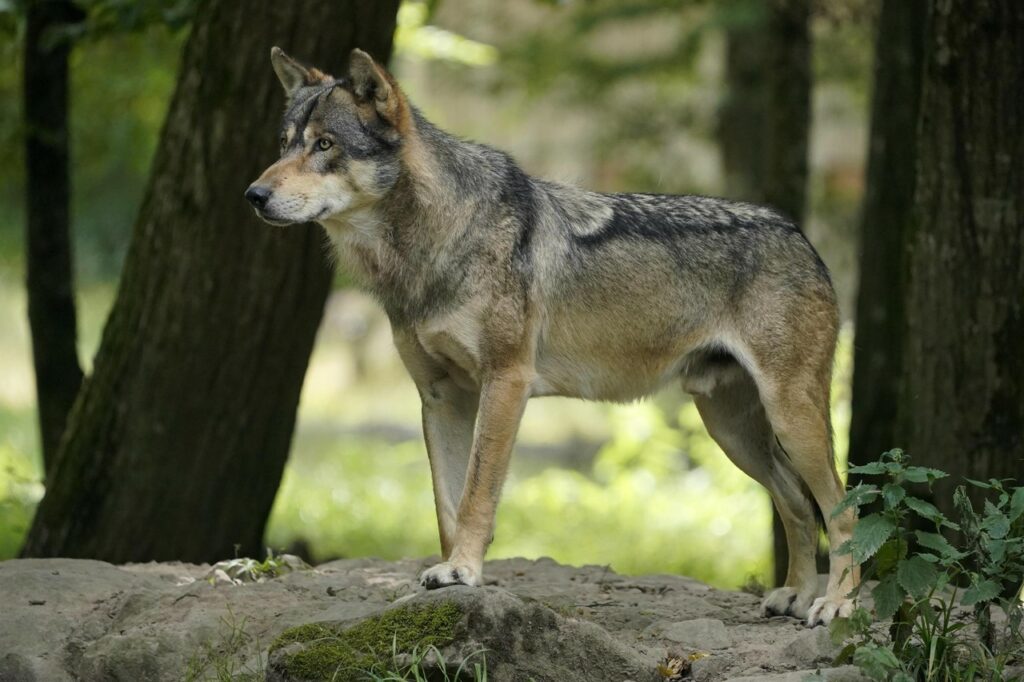Just as the wolf is making a welcome comeback in almost all European countries, showing the success of ongoing conservation efforts, I am saddened to witness the unwelcome comeback of the “big bad wolf” narrative.
We are no longer used to the presence of wolves and continue to have a controversial relationship with this iconic animal, Europe’s top native predator. Wolves were once driven to extinction across Europe with the exception of a few pockets of resistance (Eastern Europe and certain remote regions of Spain and Italy).
But thanks to strict protection measures under the Bern Convention and the Habitats Directive, wolf populations have organically rebounded in recent years and are now estimated at around 20,000 individuals according to the European Commission’s data collection last September and its in-depth analysis.
While this is something to be celebrated for most people, a few very vocal and influential farming and hunting lobbies have been calling for a weakening of the wolf’s protection status, alleging that wolf packs now pose a threat to rural livelihoods due to farm animal predation, not to mention the danger they would pose to humans (an unfounded claim like many others: there have been no fatal wolf attacks on humans in the 21st century in Europe.
In spite of all available scientific evidence that killing wolves does not work to prevent farm animal predation, the European Commission put forward a proposal just before Christmas last year to revise their protection status under the Bern Convention.
This change would enable the Commission to amend the Habitats Directive, downgrading the wolf’s protection status if approved. Should this happen, Member States will have the option to authorise regulated wolf hunting in their territories. This decision begs the question of ecological sense. It is not supported by science nor by European citizens, and there are effective preventive measures to avoid wolf-farm animal conflict as well as monetary compensation for farmers who, in spite of their best efforts, lose animals due to wolf attacks.
This happens against the backdrop of a serious wolf razzia started last year in Switzerland. As a result of the vocal demands of mountain farmers who were starting to lose sheep to wolves, in 2023 Switzerland authorised the culling of entire packs of wolves. Similar legal conflicts over the authorisation of wolf culls - demanded by the local farming and hunting lobbies - also regularly make the news in Norway.
Endangering biodiversity in all of Europe
“The proposed change is endangering the biodiversity in all of Europe and in that, it’s a destructive proposal,” wildlife ambassador Misha Istratov says. “In Sweden however, this change would go unnoticed since the country has not abided the rules according to the Bern Convention and has been culling wolves yearly. Sweden has been reported to the EU Commission on this non-compliance with regulations and has been awaiting a procedure since the filing in 2011.”
Wolves are so-called “apex” predators that fulfil several important ecological roles, the main one being the direct control of prey populations (wild boars, deer and other hoofed animals).
It has been demonstrated that a high presence of hoofed animals (ungulates) causes environmental degradation due to overgrazing; by preying on them and causing them to be alert (the “fear effect”), wolves effectively control grazing pressure and contribute to improving biodiversity, an essential component in the rewilding of our natural spaces.
The leftovers of their prey are eaten by scavenging animals, whose numbers increase in wolf-populated areas. Last but not least, wolves can promote environmentally conscious tourism with the correct information and precautions.
My main objection to weakening the wolf protection status is that sentient beings should never be used as pawns in ideological battles. The old tale of the bad wolf is exactly that: a tale. Wolves prefer predating wild ungulates over farm animals and, if unprovoked, are harmless towards humans.
Frustrating as it is, we witnessed time and again in the past several months how European institutions respond to the pressure of lobbies when it comes to protecting consumers, the environment, and animal welfare. This is only another case in point that goes against all we know about wolf ecology. I urge all the EU institutions to leave the wolf hunt to the tales and base their future decisions on science and the sensitivity of the majority of EU citizens.
Funding for prevention measures
Farmers can readily count upon European funding for prevention measures where there is a risk of farm animal predation. One example is wolf-proof fencing. These are special enclosures that are very effective in preventing wolves from attacking farm animals. The presence of guard dogs, which farmers can equally acquire via public funding, is also extremely dissuasive. Member States can even provide funding to cover the dogs’ maintenance costs.
There is much to learn from successful case studies of flock protection that made the coexistence with wolves and other large carnivores possible: some of these best practices have been collected and made publicly available by the European Commission. However, now that European elections are approaching and certain lobbies are raising their voices, walking the talk is trickier.
It is unbelievable that we would prefer to preventively kill our most iconic wild animals, so painstakingly reintroduced, instead of using all the means at our disposal to coexist with them peacefully. Even more so if we consider that killing individual wolves is ineffective in preventing attacks on farm animals, according to a study by the European Parliament.
Scientists warn that only mass extermination could obtain that result, and I sincerely hope that nobody would even remotely consider that option. Conversely, more hunting will weaken our recovering but fragile wolf populations, whose genetic pool is already threatened by hybridization with dogs and inbreeding.
We should keep in mind that the voices calling for the culling of wolves are, as is often the case, those of the few. Most farmers and citizens living in rural areas support protecting wolf populations and introducing measures that will ensure co-existence. EU representatives should pay attention to these voices if they want their citizens to keep faith in the EU democratic process.
For decades, conservationists and institutional bodies have worked hard and invested considerable amounts of money to encourage the recovery of native wolf populations. Jeopardising these results now would entail a mismanagement of public funds. The unfortunate turn of events whereby the European Commission is now set on reversing these efforts is the outcome of the umpteenth polarised discourse led by certain farming and hunting lobbies sectors.


